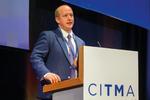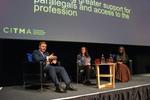Autumn Conference 2022: Stepping into the future
Our Autumn Conference in Birmingham was a great opportunity for practitioners at all career stages to learn from each other and collaborate as we explored the questions that will shape our industry’s future.

The trade mark profession is undergoing rapid change, and our conference, titled “Stepping into the future”, offered us a platform to consider the developments that we expect to see both in the short term and in the coming years.
The conference took place at the Library of Birmingham, an inspiring city‑centre venue that offered us a flexible environment in which to learn and network together.
We enjoyed a cabaret‑style setup, with delegates gathered at round tables to promote a collaborative approach to the day.
This format allowed us to share our thoughts and reflections as the day progressed, particularly during our session on non‑fungible tokens (NFTs).
Presidential opener

In her opening address, CITMA President Rachel Wilkinson‑Duffy welcomed delegates and reflected on our new representation campaign.
In order to strengthen the standing of the UK’s world‑class IP system on the international stage, our new campaign suggests to the Government that everyone who represents someone else in front of the UK IPO must be appropriately regulated and insured in the UK.
They must also have an appropriate understanding of the UK system.
This change will level the playing field for UK practitioners in relation to their competitors based in other countries where practitioners are already required to be qualified and regulated in order to work in the region.
In contrast, the UK currently only requires an address for service.
UK case law update

Jonathan Moss (Hogarth Chambers) offered us an update on all the key developments in UK case law over the past year, in particular drawing our attention to the increasing tendency for the IPO to strike out bad faith claims.
“The IPO has been much stricter in my experience in not allowing bad faith applications to go ahead,” Jonathan told delegates.
He also noted that we have recently seen survey evidence become more prevalent.
For example, it was used effectively in the Lidl v Tesco case.
Spotlight on NFTs
The focus of this conference was the changes that our industry will see in the future, and this was most characterised by our exploration of the impact of NFTs on IP.

Alex Watt (Howard Kennedy) helped delegates to better understand how we might expect NFTs to affect IP practice going forward.
He noted some interesting trends, giving the Museum of Modern Art in New York as an example, which is selling a Picasso in order to invest in NFTs.
Making use of our collaborative round‑table setup, Alex invited delegates to discuss a series of questions, which helped us to share views on this emerging, and often complex, area of practice.
This opened up the room for lots of interesting conversation, with delegates sharing their expertise and opinions to debate and reflect on what the future may hold/
Anti‑counterfeiting and geopolitics
To help us understand the relationship between geopolitical upheaval and efforts to prevent counterfeiting, Tom Nener (Pinsent Masons) pointed out three key global events that have been providing increasing opportunities for counterfeiters:

- the US–China trade war;
- the COVID-19 pandemic; and
- the Russia–Ukraine conflict.
Tom said that it is too early to really understand the impact of the conflict between Russia and Ukraine. However, “we have already seen a spike in counterfeits of certain products, such as cooking oil”, he noted.
In addition, he explained that Russia already hosts a strong market for counterfeit goods, with 40% of handbags sold in the region found to be counterfeit.
The Russian Government’s increasing reluctance to enforce foreign IP rights will likely increase the scale of this problem.

Tom also explored the possible avenues that we might consider when promoting a lower level of counterfeiting in a market, particularly in relation to how we might prevent pirated media from spreading on the internet.
Internet‑based pirating is particularly challenging to control, with perpetrators avoiding becoming tied to a location by continuously moving around.
In order to counter this, Tom laid out the importance of developing strategies that target each section of the supply chain, to maximise the chances of interception.
Good practice tips
The IPO’s Heather Harrison (Senior Hearing Officer and a Company Names Adjudicator) offered our delegates some insider tips on how to best work with the Office.

She noted that the level of professionalism and competence that the IPO sees from Trade Mark Attorneys “continues to rise” – a testament to the hard work that our members put into representing their clients in front of the IPO. However, Heather identified some pitfalls, including:
- Not reviewing pleadings in advance of final submissions. Reviewing your pleadings allows you to be discerning in terms of what evidence needs to be included.
By reviewing your pleadings consistently during the process, you can also identify gaps that may be present in your argument and source the evidence or witnesses necessary to fill those gaps. - Not keeping to the submission length limit. Submissions that are longer than the specified 300 pages are likely to become repetitive or to include long lists of marks that are rarely helpful outside of bad faith oppositions.
As Heather put it: “There are only so many times you need to see something to be persuaded of a point.”
Similarly, she noted that it is by far best for a witness to demonstrate why and how the evidence presented supports what they’re saying and to draw attention to the most relevant aspects. - Applying for confidentiality without good reason specific to your case. In particular, the suggestion that the case is commercially sensitive is not a strong enough reason for confidentiality.
Heather encouraged us to bear in mind that, in the majority of circumstances, something that happened a relatively long time ago is very unlikely to be considered reasonably eligible for confidentiality.
However, she also reminded us that it is entirely acceptable to redact certain elements of evidence, for example the names or identifying details of witnesses, or the number of units of a product sold.
Security interests explored
Mei Mei Wong (DLA Piper), who has a background in finance law, took us through the crossovers between financial transactions and trade marks, and the types of security and security packages that may be created over registered and unregistered trade marks.
She explored the three most common types of security created in relation to trade marks and the steps that might be taken under each one:
- mortgage: the taking of a title upon taking security;
- fixed charge: creation of encumbrance upon taking security; and
- floating charge: the appointment of an administrator.
Mei Mei then shared the key risks of which practitioners must be aware in order to come as close as possible to perfect security interests.
Paralegals: Improving access

Kane Ridley (Keltie LLP) and Carol Nyahasha (Elkington + Fife) sat down with Kelly Saliger (CMD) to share their wisdom on the changing nature of the paralegal profession and to consider the ways in which our industry can support paralegals.
They identified that, increasingly, being a paralegal constitutes an interesting, varied and successful career in its own right – it should not be seen only as a stepping stone to becoming a CharteredTrade Mark Attorney.
Kane noted that the increased availability of technology means that far less time is now spent on data processing and other time‑consuming tasks, allowing paralegals to evolve into more engaging areas of work.
Our speakers commented that mentoring is a particularly valuable way to support paralegal careers, and that investing in growth and development for paralegals is one of the best ways to ensure a higher rate of retention.
Furthermore, long‑term mentoring opportunities can allow people to see a clearer trajectory for their own careers.
Iceland v Iceland

Mishcon de Reya’s Sally Britton, who was directly involved in the Iceland case that went to an oral hearing before the EUIPO Grand Board recently, shared with delegates her insight into what was involved in the proceedings.
This was the first ever oral hearing held by the Grand Board, and Sally offered our delegates a unique look into the proceedings, laying out for us the pathway that resulted in the case being heard.
She helped us to understand the ins and outs of the hearing itself, detailing its particular features to ensure that future teams know what to expect and what to avoid.
Finally, she explored the next steps that will now be taken. Although the hearing itself was an uncommon occurrence, understanding the form that a hearing takes represented a valuable learning opportunity for our delegates.
Exhibitors in attendance
We were also joined by a series of exhibitors, who attended the conference in order to make sure that our delegates could gain a full understanding of the services and support networks that are available to them and their clients.

These exhibitors included the IPO, Jonathan’s Voice and John Venn & Sons. Thank you to our sponsor, Corsearch, for helping us to bring together such an educational and enjoyable event.
We would also like to thank all of our speakers, delegates and exhibitors for all of the effort that they put into making the day a great success – we look forward to seeing you all again at our Spring Conference, and at more of our events over the coming months.
Click here to read the full issue.





